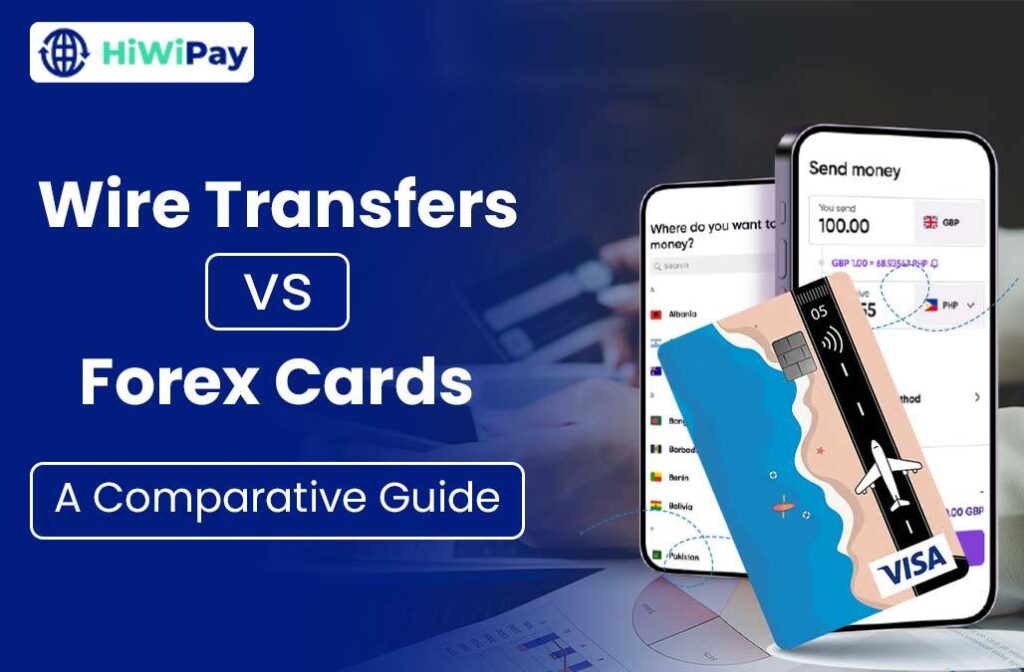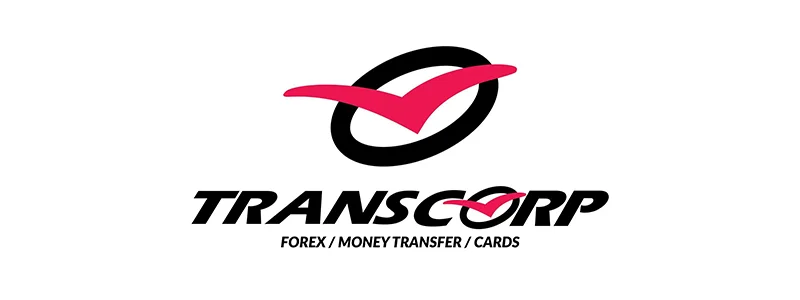What is Forex Card?
A Forex Card, sometimes called a Forex Travel Card or Prepaid Travel Card, is like a prepaid card you use when you travel to other countries. You load it up with a set amount of foreign currency before your trip.
Lots of banks, such as ICICI and HDFC, provide forex cards. One of the biggest perks is that they won’t cost you anything, though there are small fees for taking out cash from the ATM. Also, with a Forex card, you can fix the exchange rate when you load it, shielding yourself from rate changes. All you need to do is keep an eye on the exchange rate when loading money. It is a handy, safe, and budget-friendly way to manage your money abroad, letting you pay for things easily while you are away from home.
What is Wire Transfer?
A wire transfer is a way to electronically transfer money from one person or place to another. It is a safe and secure way to transfer money, especially when the sender and receiver aren’t nearby or residing in another country.
Here’s how it works: when you wire money, it goes through banks. If you have a savings account, you can send money from India using a SWIFT transfer. To do this, you will need the receiver’s bank account number, bank name, swift code, bank address, and transit code. Usually, the transfer takes 1-3 working days to go through, although this can vary depending on the bank and details of the transfer.
For this kind of transfer, depending on the country and bank, you may have to pay some charges. For instance, the fees for wire transfers from India to Canada differ depending on the bank; ICICI charges INR 750 for customers in India and INR 500 for non-resident Indian customers.
Difference Between Forex Card and Wire Transfer
Here’s the difference between forex card and wire transfers:
| Basis | Forex Cards | Wire Transfer |
| Transaction fees | No transaction fees. You only pay minimal charges when you withdraw money from an ATM and for cross-currency transaction fees. | Wire transfers typically involve high transaction fees. |
| Exchange Rates | It shields you from exchange rate fluctuations and high fees for converting currencies. The exchange rate is fixed the moment you load money on the card. | When you do wire transfers, you can’t guarantee the exchange rate you’ll get. The real-time rate might be different than at the time of the transfer, which might result in loss of funds. |
| Security | You can contact the bank and block the card if it is stolen or lost. | These are vulnerable to hacking and fraud. |
| Access to Funds | As long as you have the card on you, you can access the funds anytime, anywhere. | You must wait 2-3 days to access the funds. |
| Acceptability | You can use Forex cards almost anywhere in the world. | It might not work everywhere, which can make sending money a bit tricky. |
Read More – How to Transfer Money From India to Canada for International Students
How Do Forex Cards Work?
Here’s how a forex card works:
- Getting the Card: You apply for it from a bank or card provider.
- Adding Money: Once approved, you put money on the card using internet banking, in the currency you need. The amount is converted at the current exchange rate.
- Using It: You can use the Forex Card just like a regular debit card during your travels. Whether it’s for hotels, tickets, shopping, or meals, you can swipe it wherever cards are accepted.
- Automatic Currency Conversion: When you are in a different country, the card recognises the local currency and pays accordingly.
How Does a Wire Transfer Work?
Here’s how a wire transfer works:
- Start: The person sending the money goes to their bank and gives them details about who they are sending the money to, like the receiver’s bank account number, bank name, swift code, bank address, and transit code. They also say why they are sending the money.
- Transfer Instructions: Once the bank has all the information, they send a secure message to the receiver’s bank with instructions on how to get the money.
- Funds Transfer: Once the receiver’s bank gets the message, they will put the money in the right bank account.
- Settlement: After the money is in the recipient’s account, the two banks sort out the payment between themselves.
Wire Transfers vs. Forex Cards: Which is better? Should you Choose an International Debit Card?
The choice between Forex Card, Wire Transfer, and International Debit Card can be confusing and daunting, so here are the pros and cons of each one that can help you choose the right one as per your needs:
Forex Card
Pros:
- Convenient: You can get a Forex card without needing an account with a foreign bank.
- Cost-effective: The fees for getting a Forex card are usually low.
- Protection from fluctuating exchange rates: The exchange rate is locked when you put the money in the card.
- Multiple currencies: You can load different currencies onto one card.
Cons
- Limited acceptance: Some places, like universities, may prefer wire transfers over Forex cards.
- Spending limit: There is usually a cap on how much you can spend within a day.
Wire Transfer
Pros
- Suitable for large amounts: If you need to send a lot of money quickly, wire transfers can be the way to go.
- Widely accepted: Most universities prefer wire transfers for tuition payments.
Cons
- Transfer fees: Both sending and receiving banks may charge fees for wire transfers.
- Long processing time: It can take up to 3 days for the transfer to go through.
- Exchange rate fluctuations: If the transfer involves currency conversion, the exchange rate might change between the time of the transfer and when the recipient gets the money, potentially causing losses.
International Debit Card
Pros
- Global acceptance: These cards are likely to be accepted worldwide since they are issued on popular networks with global coverage.
- Better exchange rates: Some international cards offer more favourable exchange rates.
- Rewards: You might get better rewards or cashback for using these cards, especially for international transactions.
Cons
- Fraud risk: There is a risk of fraud associated with international transactions.
- Unstable exchange rates: Exchange rates can fluctuate unpredictably.
- Extra charges: You might face additional fees from your bank.
Bottom Line
In conclusion, both wire transfers and forex cards play vital roles in facilitating global financial transactions. While wire transfers remain the go-to option for large-scale transfers, forex cards come out as much more convenient, flexible, and cost-effective for individuals for international money transfers. However, if you are looking for a support system to transfer money, then go for money transfers via HiWiPay. They can transfer money within 24 hours. No long bank queues, paperwork hassles, or high markup fees. All you need to do is complete the KYC ONCE and digitally submit the A2 Form from anywhere, anytime, to transfer money safely. Visit HiWiPay website or download the app today.
Frequently Asked Questions
Are foreign students able to benefit from a Forex card?
Yes, forex cards are particularly advantageous for foreign students as they offer a convenient and secure means of managing expenses abroad.
Is a currency card preferable to a credit card for international purchases?
If you are all about safety, keeping track of your spending, and getting good exchange rates, think about going for a Forex Card. But if you like the ease of use, perks like rewards, and having a backup stash of cash, a Credit Card might be more up your alley. It is smart to have both when you travel abroad; use the Forex Card for everyday spending and keep the Credit Card handy just in case.
What distinguishes a currency card from an international debit card?
Forex cards are specifically designed for cross-border transactions and typically support multiple currencies, whereas international debit cards may incur higher fees for foreign transactions.
Are there any limitations to using a Forex card compared to a Credit card?
Yes, there are limitations to using a forex card, like initial costs, limited acceptance, and reloading funds, whereas when it comes to a credit card, the only limitations you face are exchange rate fluctuations and international transaction cost.
Can I use a Forex card for online transactions and cash withdrawals?
Yes, forex cards can be used for both online transactions and cash withdrawals at ATMs. However, for ATM withdrawals, a small fee may be charged.
Is it better to use a credit card or Forex card abroad?
The choice between a credit card and Forex card depends on factors such as foreign exchange rates, transaction fees, and personal preferences. Forex cards offer better control over exchange rates and fees, making them a preferred choice for many travelers and international students.
References:
Works Cited
Know the Difference between Forex Cards and Wire Transfers – IBlogs. 17 Nov. 2023, www.indusind.com/iblogs/categories/manage-your-finance/know-the-difference-between-forex-cards-and-wire-transfers/. Accessed 29 Apr. 2024.
“Understand What Is Wire Transfer & How Does It Work | HDFC Bank.” Www.hdfcbank.com, www.hdfcbank.com/personal/resources/learning-centre/pay/telegraphic-wire-transfer. Accessed 29 Apr. 2024.
“What Is a Forex Card: Know the Benefits of Forex Travel Card | ICICI Blog.” ICICI Bank Blogs, www.icicibank.com/blogs/cards/what-is-forex-card-and-how-it-works. Accessed 29 Apr. 2024.
“What Is a Forex Card? A Complete Guide.” Blog-Best Foreign Exchange, 8 Apr. 2021, www.bookmyforex.com/blog/what-is-forex-card-complete-guide/. Accessed 29 Apr. 2024.
Wikipedia Contributors. “Wire Transfer.” Wikipedia, Wikimedia Foundation, 19 Sept. 2019, en.wikipedia.org/wiki/Wire_transfer. Accessed 29 Apr. 2024.








